Jackie Cohen – surprising music from LA’s most surprised musician
A testament to the healing power of art, and friendships
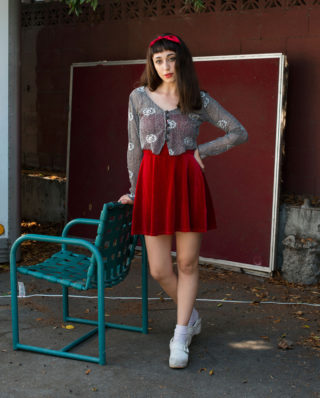
A testament to the healing power of art, and friendships
“I think I was just a little surprised. I was a legitimate step one, phase one beginner,” Jackie Cohen tells me when I ask her how she knew the songs she was writing for her first EP were any good. She’s sipping on an iced coffee, cross-legged on the floor of a rental apartment in Virginia. It’s early morning and Cohen is fighting off the last vestiges of a flu that won’t quite shift. Later, she’ll head to Montrose Studios, where she’s working with Spacebomb Records on her new material. This iteration of her life – a musician touring the country, recording tracks she has written herself – is something of an unexpected turn. She only began working on her own music as an experiment, seized by the need to make something in the midst of a creative and emotional lull after leaving college, where she minored in creative writing. Her college experience, she says, was “taxing”, and feeling reluctant to return to her job as a marketing consultant she decided to teach herself piano using laminated chord sheets, just to see if she could discover a new way to express herself.
“And so when I started writing songs and I was, like, plucking away and coming up with a way to be creative again, it felt really good. I was definitely self-conscious about it. I still don’t think of myself that way – I’m not a musician because I can’t really play anything very well. I was surprised that I was writing songs at all. I didn’t know I could do that. It wasn’t like I wrote my first song and was like, ‘Wow! This is brilliant! I’m a genius!’ It was more, like, ‘I can do this. And I like it.’”
Perhaps, though, this transformation into singer-songwriter isn’t quite as surprising as it seems. Cohen’s husband is Jonathan Rado, producer and one half of indie-rock duo Foxygen, and she has spent time touring with them, during and after college, working as a backing singer. In fact, she’s been singing with Rado since ninth grade, when he and Sam France, the other half of Foxygen, asked Cohen and her sister to join them at a set at Whisky a Go Go in their home city of LA. “We said yes, and at the last minute my sister bailed out, but I was like, ‘I wanna go!’ I was already a big fan of their music. They circulated CDs at school, just like burn CDs, and my sister and her boyfriend had them and I was already listening to them and I just thought they were the coolest thing ever. And so I went. I didn’t really know them that well, so I showed up for our five-minute rehearsal right before the show, and I’ve kind of been in the band since then.”
Since she started making her own music, being Rado’s partner has become more difficult. Not only because of the obvious pressure of writing your first ever songs with one half of Foxygen in the other room, but because of other people’s assumptions. “A lot of people ask me when they hear I’m making music, ‘do you write your songs or does Rado write them?’ And I’m like, ‘No. I write my songs.’” Although, of course, it helps when your husband is making an album with The Lemon Twigs (2016’s ‘Do Hollywood’) and he can invite them over to the house to record the instrumentals for your EP.
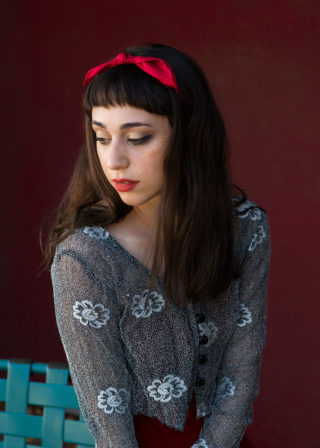
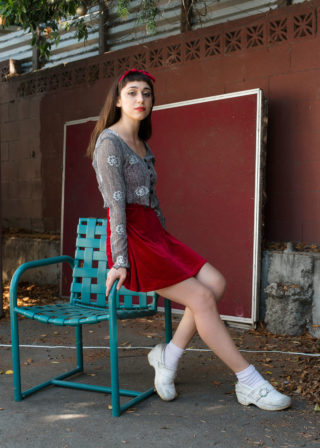
Cohen’s first record, ‘Tacoma Night Terror’, has been released as two chapters. ‘Part 1: I’ve Got the Blues’ dropped in June this year, quickly picking up a celebrity follower in Russell Crowe, who tweets almost everything she releases. ‘Part 2: Self-Fulfilling Elegy’ comes out later this month. The subtitles were inspired by the title-cards on the French films Cohen watched while making the record. The second half is lyrically darker though instrumentally more lively than the first; a kind of wired, anxious, semi-lucid sound that, as Cohen explains, comes out of her difficult college period and seems very much like “it was written by someone who is not sleeping well.”
“Things were really dark,” she says of her time at college. “I needed to get help and I didn’t want it. I was getting really, really physically sick which is something that happens when I get stressed, and I would go into the health centre and they would send me straight to see the counsellor. They would say, ‘you don’t have a throat infection you need to go see the counsellor right now.’ And so I got red flagged a bunch of times in school. So I didn’t want help, I didn’t want to think I was failing, I didn’t want to be weak in any way, I didn’t want my parents to worry. I didn’t want to talk to them about it so I just spiralled out of control.”
The work that resulted from the emotional turmoil of this period is a strange and original creation, cartoonish and layered with Cohen’s Valley-girl country-music voice, a style that was another surprise she says, emerging after she allowed her vocals to find what they wanted to do naturally. “Because I’d taken voice lessons and stuff when I was kid, I really had it pounded into me about what quality tone is, and what musical theatre projecting sounds like. And I was never the last five in the recital. I was never the finale. So I was really self-conscious about my voice and when I started playing guitar a little bit and playing piano a little bit I got really interested in female voices that aren’t Broadway voices.”
Cohen discovered Dolly Parton, Stevie Nicks and Joan Baez, and while touring with Foxygen, found Jessica Pratt (Foxygen released a cover of Pratt’s ‘On Your Own Love Again’ in 2017), who she says has one of her favourite voices of all time. It was at this point that Cohen really began to experiment with how a woman’s voice might sound. “I don’t think I was really tuned into what was going on before that. It was a good time for me to start thinking about what I could do and what I wanted to do. And a lot of the stuff I was listening to was country- and folk-inspired and I think I had latched onto that pretty hard. I was trying to teach myself how to play songs on guitar or on piano and I would look up a Fleetwood Mac song and I would be like, ‘Oh I can play this, it’s mostly G-C-D,’ and so at the same time that I was playing piano and trying to learn songs I was probably doing a Stevie Nicks impression on my downtime. I think those were the muscles that I was exercising.”
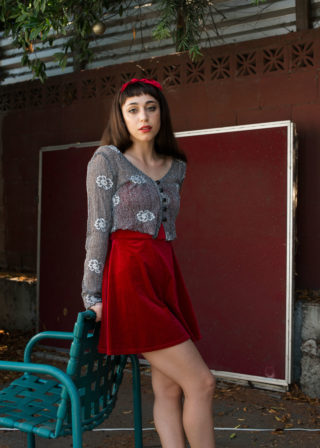
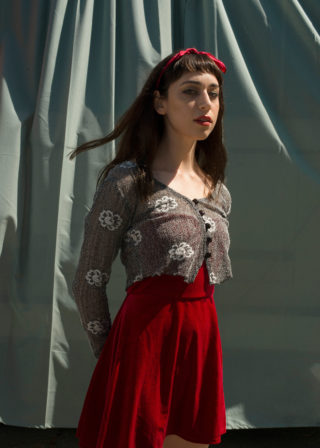
There was also a certain amount of letting other people lead the direction of the music in its incipient stages. A lack of confidence in the early material, coupled with an obvious respect for the talents of her husband and his friends, meant that Cohen had less say in the arrangement than she might allow now. She tells me that, since signing with Spacebomb and working on new songs for a forthcoming record, she feels much more able to take the reigns. Partly because the team she refers to as “the Spacebomb guys” show so much respect for her own talents.
“This time around I also feel more confident about my ideas and have had a much bigger hand in the creative direction of the instrumentals. And then I’m also working with these guys who are like the best musicians and arrangers working. And I come in and they’re just really cool, because I come in and I’m a really bad guitar player, but they’ve been so respectful to me. Like, nobody in this group has treated my work as if… no one has talked to me as if I don’t know what I’m doing. Which is something I have to deal with a lot. They sit and they think and there’s a lot of care and love and respect that goes into everything they do, which is just amazing.”
Cohen’s calm, happy demeanour and the opportunities she’s made for herself are a far cry from the dark nights alone in her college dorm she describes, not so many years ago. There’s another EP in the pipeline (due out sometime next year), she’s just returned from a tour, supporting Alex Cameron, and she’ll open for Mac DeMarco in Europe in October. A testament to the healing power of art, and friendships. “I’m just still working with my friends, and I just feel like there’s this really amazing community around me. Yeah. I dunno,” she shrugs. “I’m really proud of the work we’re doing.”